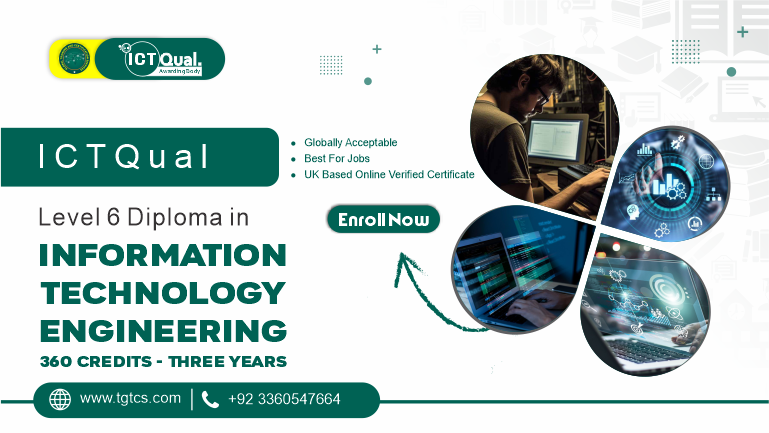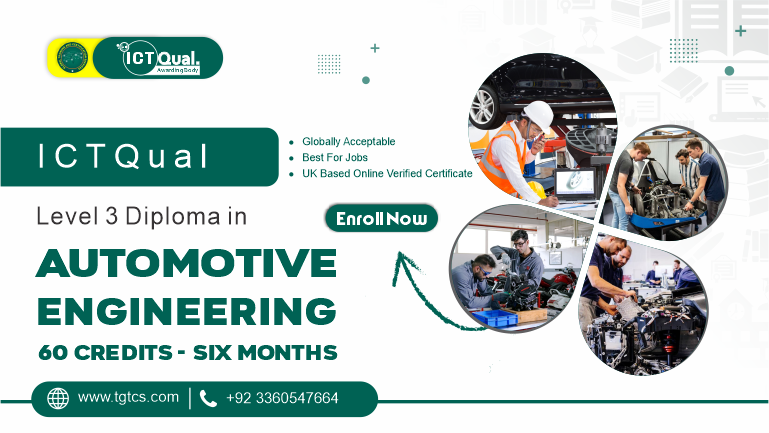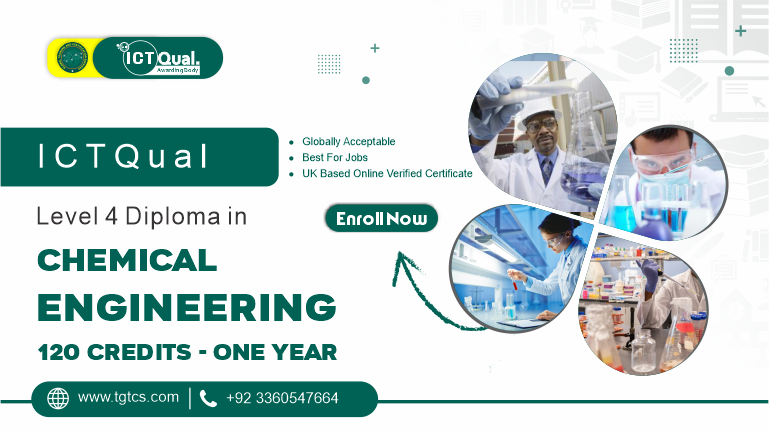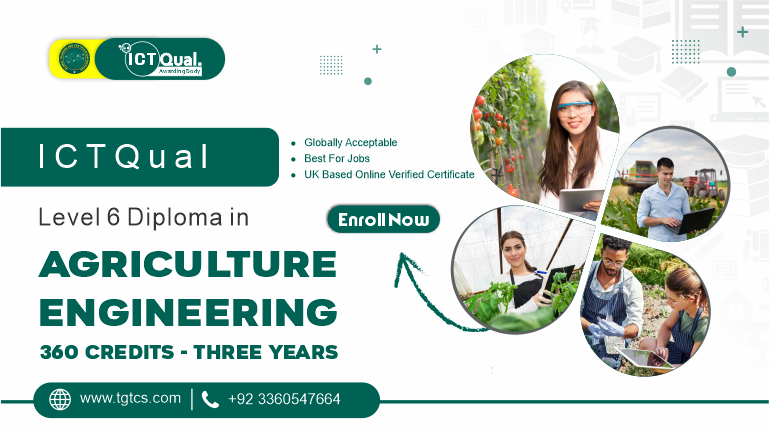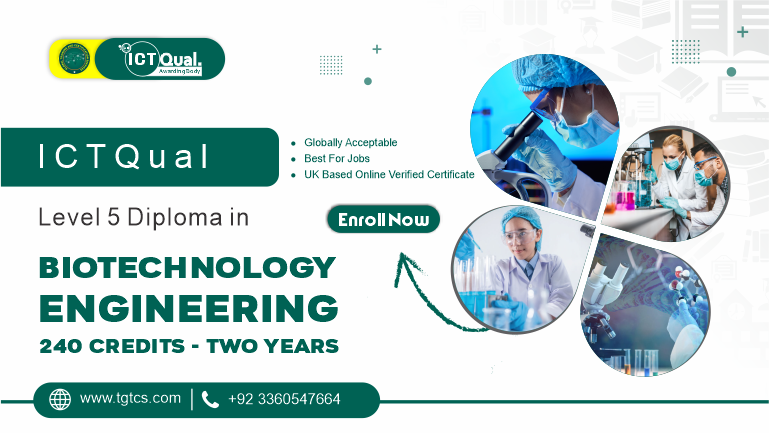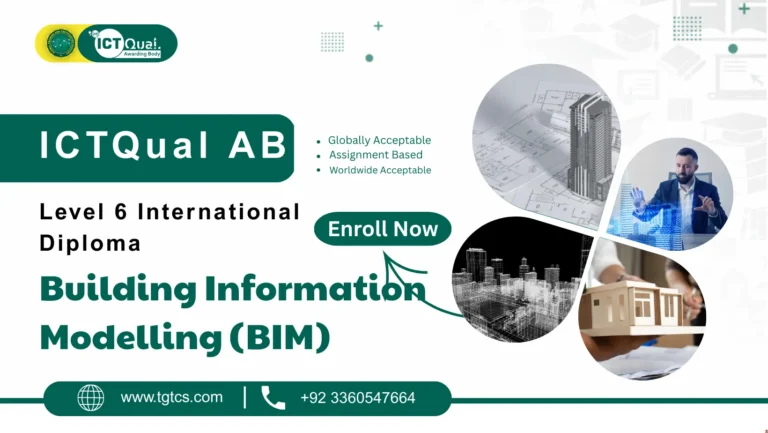ICTQual Level 6 Diploma in Information Technology Engineering 360 Credits – Three Years
The ICTQual Level 6 Diploma in Information Technology Engineering (360 Credits) offers a comprehensive, three-year program designed to equip you with the technical expertise and practical skills needed to thrive in the dynamic world of IT engineering. Whether you’re looking to advance in your current role or pursue a new career in IT, this qualification offers a strong foundation for your future success.
The ICTQual Level 6 Diploma in IT Engineering is a high-level qualification that covers core areas of IT systems, computer networks, software engineering, and information security. Spanning three years, this program provides you with in-depth theoretical knowledge and practical experience. You will develop advanced skills in the design, development, and management of IT systems, preparing you for a variety of professional roles in the technology sector.
The ICTQual Level 6 Diploma in Information Technology Engineering (360 Credits) offers a well-rounded and industry-relevant education that prepares you for a successful career in IT. With a curriculum covering everything from networking and programming to security and cloud computing, this diploma equips you with the technical skills and professional knowledge needed to thrive in today’s rapidly evolving technology landscape.
The Global Training and Certification Services (TGTCS) is Directly Approved Training Centre of ICTQual
The ICTQual Level 6 Diploma in Information Technology Engineering (360 Credits – Three Years) is a comprehensive and advanced qualification designed to provide students with the knowledge and practical skills needed to excel in the dynamic IT engineering sector. Over the course of three years, students will gain expertise in areas such as computer systems, networking, software development, IT security, cloud computing, and emerging technologies like IoT and AI. The program is structured to offer a strong foundation in IT engineering during the first year, followed by more advanced and specialized topics in the second and third years.
Graduates of this diploma will be equipped to pursue a variety of professional roles such as IT Engineer, Network Engineer, Software Developer, Cybersecurity Analyst, and Cloud Solutions Architect. Additionally, the course offers a solid platform for further academic study and industry certifications. With a focus on both technical proficiency and professional development, the ICTQual Level 6 Diploma is ideal for those seeking to advance in the IT engineering field or embark on a rewarding career in technology.
Mandatory Units
The Units of Level 6 Diploma in Information Technology Engineering 360 Credits – Three Years are as :
Year 1: Foundation and Core Concepts
- Introduction to Information Technology
- Computer Architecture and Hardware
- Operating Systems Fundamentals
- Networking Fundamentals
- Programming Principles
- Database Design and Management
- Web Technologies and Development
- IT Support and Troubleshooting
- Mathematics for IT
- Introduction to Cybersecurity
- Systems Analysis and Design
- Project Management Fundamentals
Year 2: Specialized IT Engineering
- Advanced Networking and Protocols
- Cloud Computing and Virtualization
- Advanced Programming Techniques
- Advanced Database Systems
- Mobile Application Development
- System Security and Risk Management
- Enterprise IT Infrastructure
- Software Engineering and Development Lifecycle
- IT Management and Governance
- Business Intelligence and Data Analytics
- Human-Computer Interaction
- Ethical and Legal Issues in IT
Year 3: Professional Development and Advanced Implementation
- Advanced Networking Technologies
- Artificial Intelligence and Machine Learning
- Cybersecurity for IT Professionals
- Cloud Infrastructure and Services
- Project Management for IT Projects
- Advanced Software Development Practices
- System Integration and Implementation
- IT Research Methodologies
- Professional Practice and Ethics
- Internship/Industry Placement
- Capstone Project I: System Design and Development
- Capstone Project II: Evaluation and Implementation
Learning Outcomes for the Level 6 Diploma in Information Technology Engineering (360 Credits – Three Years):
Year 1: Foundation and Core Concepts
- Introduction to Information Technology: Gain an understanding of the fundamental concepts of IT systems, including hardware and software components.
- Computer Architecture and Hardware: Learn the structure and function of computer hardware and how it interacts with software.
- Operating Systems Fundamentals: Acquire knowledge of operating system concepts, functions, and administration techniques.
- Networking Fundamentals: Learn about key networking concepts, protocols, and the basics of network infrastructure design.
- Programming Principles: Develop foundational programming skills to create basic software solutions.
- Database Design and Management: Design relational databases and utilize SQL for data manipulation and querying.
- Web Technologies and Development: Gain skills in developing simple web applications using HTML, CSS, and JavaScript.
- IT Support and Troubleshooting: Learn to identify and resolve common hardware and software issues in IT systems.
- Mathematics for IT: Apply mathematical principles to solve IT-related problems, including working with algorithms and data structures.
- Introduction to Cybersecurity: Understand fundamental cybersecurity concepts, common threats, and basic protective measures.
- Systems Analysis and Design: Analyze business needs and design IT systems to meet those requirements.
- Project Management Fundamentals: Learn the basics of project management and apply these principles to IT projects.
Year 2: Specialized IT Engineering
- Advanced Networking and Protocols: Design and configure complex network infrastructures using advanced networking protocols.
- Cloud Computing and Virtualization: Understand cloud computing models and deploy virtualized environments.
- Advanced Programming Techniques: Apply advanced programming techniques such as object-oriented programming and design patterns.
- Advanced Database Systems: Design, optimize, and manage complex database systems for enterprise-level applications.
- Mobile Application Development: Develop and deploy mobile applications across different platforms.
- System Security and Risk Management: Assess IT system vulnerabilities and implement security measures to mitigate risks.
- Enterprise IT Infrastructure: Design and manage enterprise IT infrastructures to support large-scale business operations.
- Software Engineering and Development Lifecycle: Apply software engineering principles throughout the entire software development lifecycle.
- IT Management and Governance: Implement IT management strategies and governance models to align IT systems with business goals.
- Business Intelligence and Data Analytics: Analyze and interpret data to provide valuable business insights and support decision-making.
- Human-Computer Interaction: Design user-friendly interfaces to enhance user experience based on human-computer interaction principles.
- Ethical and Legal Issues in IT: Understand and apply ethical principles and legal requirements in the IT industry.
Year 3: Professional Development and Advanced Implementation
- Advanced Networking Technologies: Implement advanced networking technologies such as Software-Defined Networking (SDN) and 5G.
- Artificial Intelligence and Machine Learning: Use AI and machine learning algorithms to solve complex IT engineering problems.
- Cybersecurity for IT Professionals: Implement advanced cybersecurity strategies to safeguard IT systems in professional environments.
- Cloud Infrastructure and Services: Manage cloud infrastructure and services to optimize business operations.
- Project Management for IT Projects: Lead and manage large-scale IT projects using advanced project management techniques.
- Advanced Software Development Practices: Apply best practices in software development to build scalable, high-quality software solutions.
- System Integration and Implementation: Integrate diverse IT systems into a unified solution, ensuring compatibility and high performance.
- IT Research Methodologies: Conduct research in IT, applying appropriate methodologies to address technical challenges.
- Professional Practice and Ethics: Demonstrate professionalism and adherence to ethical standards within the IT industry.
- Internship/Industry Placement: Apply theoretical knowledge in a professional IT environment, gaining hands-on experience.
- Capstone Project I: System Design and Development: Design and develop a functional IT system or solution based on real-world industry requirements.
- Capstone Project II: Evaluation and Implementation: Evaluate and implement the developed IT system, applying feedback and making improvements.
The ICTQual Level 6 Diploma in Information Technology Engineering (360 Credits – Three Years) offers numerous benefits for students looking to build a solid foundation and advance in the field of IT engineering. Some of the key benefits of this course include:
- Comprehensive Knowledge and Skills
The course provides a thorough understanding of key IT engineering concepts, from foundational topics like computer architecture and networking to advanced areas such as cloud computing, artificial intelligence, and cybersecurity. Students will gain the knowledge required to work with cutting-edge technologies and the practical skills to solve complex IT challenges. - Industry-Relevant Training
With a curriculum designed to meet the evolving demands of the IT sector, this diploma equips students with skills that are directly applicable to real-world situations. Students will develop hands-on experience with programming, database management, networking, and security, preparing them for immediate contribution in the workplace. - Strong Foundation in Core IT Disciplines
The first year of the course focuses on building a strong foundation in essential IT engineering areas such as operating systems, database design, IT support, and networking. This prepares students for the more advanced topics covered in the later stages of the program. - Specialized Skills for Career Advancement
In the second and third years, students dive deeper into specialized areas of IT engineering, including cloud computing, mobile app development, business intelligence, and machine learning. These advanced topics open doors to a wide range of high-demand career paths in IT. - Real-World Experience through Internships and Projects
The course includes industry placements and capstone projects, allowing students to apply their knowledge to real-world IT problems. These hands-on experiences are invaluable in building a professional portfolio and improving employability. - Career Opportunities
Graduates will be well-equipped to pursue careers as IT Engineers, Network Engineers, Software Developers, Cybersecurity Specialists, Cloud Solutions Architects, and IT Project Managers, among other roles. The comprehensive skill set gained throughout the program ensures graduates are ready for diverse opportunities across industries such as telecommunications, finance, healthcare, and more. - Pathway to Professional Certifications
The knowledge gained from this diploma provides a solid foundation for pursuing additional certifications, such as CompTIA, Cisco, or Microsoft certifications, further enhancing career prospects and professional recognition. - Global Career Prospects
The course’s broad focus on globally relevant IT engineering concepts makes graduates highly sought after by international companies and organizations. Graduates can pursue opportunities in global tech firms, startups, and large enterprises, or even engage in freelance work across borders. - Professional Development
Through coursework on IT management, ethics, and professional practices, students will develop the soft skills necessary for leadership roles. Graduates will be well-prepared for team-based projects, leadership positions, and decision-making responsibilities. - Academic Progression
For students wishing to continue their studies, the ICTQual Level 6 Diploma provides a pathway to further academic qualifications, including bachelor’s or master’s degrees in IT, engineering, or related fields. This diploma also positions students for entry into specialized research and development roles.
The ICTQual Level 6 Diploma in Information Technology Engineering (360 Credits – Three Years) is ideal for individuals who are passionate about technology and want to develop advanced skills in IT systems, software development, cybersecurity, networking, and more. The ideal learner for this course will typically have the following characteristics:
1. Interest in Information Technology and Engineering
- The ideal learner has a strong passion for IT, technology, and engineering. They are eager to learn about how computer systems work, how networks are built, and how software is developed and maintained. They are excited about emerging technologies like cloud computing, artificial intelligence, and machine learning.
2. Strong Analytical and Problem-Solving Skills
- A key trait for success in this course is the ability to think critically and solve complex problems. The ideal student enjoys troubleshooting issues, finding solutions to technical challenges, and working through problems systematically to find effective resolutions.
3. Motivated and Self-Disciplined
- Since this diploma involves both theoretical learning and hands-on application, the ideal learner is motivated, self-disciplined, and able to manage their time effectively. They are committed to completing assignments, projects, and assessments and are prepared to invest the effort required to succeed in the program.
4. Strong Foundation in Basic IT Skills
- While prior experience with IT is beneficial, this course is designed to accommodate learners who have a basic understanding of IT, computer science, or engineering. Those with knowledge of programming, networking, or computer hardware would find it easier to grasp more advanced topics.
5. Desire for Career Advancement or Change
- The ideal learner may be looking to advance in their current IT role or shift into a more specialized area of IT engineering. They are interested in pursuing a career in fields like software development, network engineering, cybersecurity, cloud solutions, and more, and they are committed to gaining the skills necessary to succeed in these roles.
6. Interest in Continuous Learning and Development
- The IT field is constantly evolving, and the ideal learner embraces the idea of lifelong learning. They are eager to stay updated with new technologies, best practices, and industry trends, and they are interested in furthering their education through certifications or advanced studies after completing the diploma.
7. Team-Oriented and Collaborative
- Although much of the work in IT engineering is individual, the ideal learner enjoys working as part of a team, collaborating on projects, and sharing ideas. They are comfortable in group settings, as the course involves group projects and interactions with peers.
8. Attention to Detail and Precision
- The ideal learner is detail-oriented, able to pay close attention to the specifics of systems, code, network designs, and other technical tasks. Precision is important in IT, and the learner must be able to perform tasks accurately and thoroughly.
9. Problem-Solving and Innovation Mindset
- The ideal learner enjoys working on complex, real-world problems and is motivated by the challenge of finding innovative solutions. They are creative and eager to experiment with new ideas, tools, and technologies in their IT work.
10. Strong Communication Skills
- The ability to clearly explain complex technical concepts is crucial in the IT field. The ideal learner has the communication skills necessary to collaborate with colleagues, explain technical solutions to non-technical stakeholders, and produce well-written documentation and reports.
11. Career-Oriented and Goal-Driven
- The ideal learner is driven by career goals and is focused on gaining the qualifications and skills necessary to secure high-level positions in the IT industry, whether in development, systems analysis, cybersecurity, or network engineering.
Graduates of the ICTQual Level 6 Diploma in Information Technology Engineering are well-positioned to pursue a variety of career and academic opportunities to advance their expertise in the IT sector. Upon completing this program, you will have the qualifications and skills necessary to progress in both professional and academic fields. Here are some key progression opportunities:
1. Professional Certifications
- Cisco Certified Network Associate (CCNA): Graduates can specialize in networking by obtaining certifications like CCNA, enhancing their job prospects in network administration and support.
- CompTIA Security+: This certification strengthens graduates’ cybersecurity expertise, opening doors to roles in securing IT infrastructures—an increasingly vital area in the IT industry.
- Certified Information Systems Security Professional (CISSP): Ideal for those pursuing careers in cybersecurity or IT risk management, CISSP is a highly recognized certification in the security field.
- AWS Certified Solutions Architect: For those focused on cloud computing, this certification offers opportunities in managing cloud infrastructure and services.
2. Career Advancement in IT Engineering
- Network Engineer: Graduates can step into network engineering roles, utilizing advanced knowledge of networking protocols to design, implement, and manage network infrastructures.
- Software Developer: The skills gained in programming, software development, and engineering methodologies make graduates highly qualified for software development positions.
- IT Project Manager: Graduates interested in managing IT projects can take on roles where they oversee the delivery of IT solutions, ensuring successful project outcomes within timelines, budgets, and quality expectations.
- Cybersecurity Analyst: With a solid grounding in cybersecurity, graduates can pursue positions focused on protecting IT systems and sensitive data from cyber threats.
3. Entrepreneurship
- Start Your Own IT Business: Equipped with practical skills and technical expertise, graduates can venture into entrepreneurship by launching their own IT businesses. This could involve providing IT support, system design services, or software development solutions to clients.
4. Specialized Career Paths
- Cloud Architect: Graduates with expertise in cloud computing can transition to cloud architecture roles, assisting businesses in designing and implementing cloud-based infrastructure.
- Data Analyst/Scientist: For those with an interest in data analytics, graduates can progress to roles in data science, where they analyze large datasets to generate business insights and guide decision-making processes.
- AI/ML Engineer: Graduates can enter the fields of artificial intelligence and machine learning, applying their programming and system integration skills to develop intelligent systems and applications.
5. Industry-Specific Roles
- Healthcare IT Specialist: With increasing demand for IT solutions in the healthcare sector, graduates can contribute by developing and managing healthcare information systems.
- Financial Technology (FinTech) Specialist: Graduates interested in both finance and technology may pursue opportunities in FinTech, working on innovative software and systems for financial institutions.
The ICTQual Level 6 Diploma in Information Technology Engineering offers numerous pathways for further study, industry certifications, career advancement, or even entrepreneurship. Graduates are equipped with the skills and knowledge to pursue higher education, certifications, career growth, or start their own businesses across various specialized fields within IT.
Course Overview
Course Level
Level 6
Course Units
36 Mandatory Units
Duration
Three year
